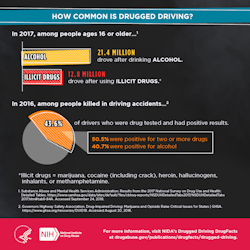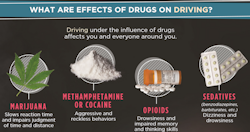Drug-Impaired Driving
You can't drive safely if you're impaired. According to the Governors Highway Safety Association, In the U.S., over 40% of the drivers involved in fatal car crashes tested positive for drugs.
According to the National Highway Traffic Safety Administration (NHTSA) and the National Transportation Safety Board (NTSB), the top three substances most commonly associated with impaired driving and resulting accidents are:
- Alcohol: Alcohol remains the most frequently detected substance in impaired driving incidents. It significantly impairs motor coordination, reaction time, and judgment, leading to a high risk of accidents.
- Cannabis (Marijuana): Cannabis is the second most commonly detected drug in impaired driving cases. It impairs motor skills, lane tracking, and cognitive functions, which increases the likelihood of crashes. Often, cannabis is found in combination with alcohol or other drugs, which can amplify its impairing effects.
- Prescription Medications (e.g., Opioids and Benzodiazepines): Certain prescription drugs, especially those that cause drowsiness or impair cognitive functions, are also frequently involved in impaired driving incidents. These medications can slow reaction times, impair coordination, and increase the risk of accidents.
- Some prescription drugs can induce drowsiness, cause nausea, affect judgment, and lessen coordination, all of which can prove fatal when driving.
- Over-the-counter drugs may cause drowsiness, dizziness, nausea, irregular heartbeat, or shakiness. Users should avoid operating motor vehicles if they are experiencing any side effects from the medication.
- Prescription drugs such as opioids, sedatives, muscle relaxants, and some antidepressants have increased crash risk.
- A medication may not impair you on its own. However, if taken with a second medication or with alcohol, it may cause impairment.
Violating state DUI laws that make it illegal to drive impaired by any substance can result in arrest. This includes prescription drugs and over-the-counter medications.
Impaired drivers can't accurately assess their own impairment – which is why no one should drive after using any impairing substances. Remember: If you feel different, you drive differently.
To learn more about the perils of impaired driving, visit NHTSA's Drug-Impaired Driving website.
Knowledge Check Choose the best answer for the question.
1-7. What is the most frequently detected substance in impaired incidents while driving cases?
You forgot to answer the question!


